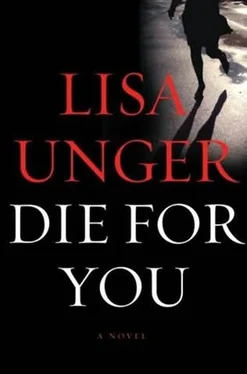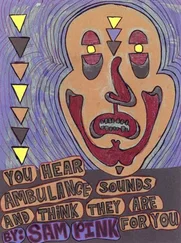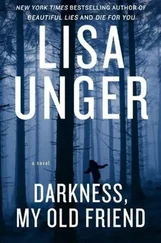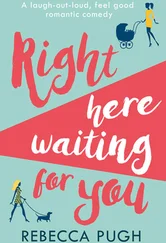A suicide, a miscarriage, a sudden disappearance. All abbreviations, interruptions. Variations on a theme that has run through my life.
The tickets were easily purchased with Jack’s credit card, and even though as we waited to board the plane I saw my picture flash briefly on one of the televisions mounted up high, no one even glanced in my direction. The sound was down for some reason. The text on the screen read: Real-Life Mystery: The Downtown Murder of Three People Linked to Missing Husband of Bestselling Author . The story was obviously small news at this point. It wasn’t even on the screen for thirty seconds.
I was five years younger in that photo and maybe ten pounds heavier when it was taken, but I might still have been recognizable if I hadn’t tied back my hair into a bun at the base of my neck, tucked it beneath a gray knit cap pulled down over the bandage on my head, and donned a pair of round wire-rimmed glasses that I needed but never wore.
But maybe it was more than that. Maybe it was the simple fact, as Marcus always claimed, that people weren’t looking anymore. They’ve got their earbuds in. They’re staring at tiny screens that fit in a palm. They’re talking on the phone, eyes blank, unseeing.
Even though I knew I wasn’t officially a suspect, I kept waiting for the police to arrive. Maybe my name was on some kind of a watch list of people not allowed to leave the country? I’d expected to be stopped at check-in, at security. But no, we’d glided through security checks, while a young mother was forced to empty her bags, carry a weeping toddler through one of those machines that blows air on you in sharp, quick blasts. Her little boy screamed in fright. I thought of my sister, the kids, as we walked past them.
ANOTHER THEME THAT runs though my life: airplanes. After my father’s death, I spent long hours lying in the grass behind my house, staring up at the sky. I was obsessed with the idea of direction, the Catholic concept of heaven being up and hell being down. I knew suicide was a sin, punishable by eternal damnation. I tried to imagine endless suffering for my father. I couldn’t. I couldn’t see him punished for being too afraid, too weak, and too sad to go on. It didn’t seem right-nor did the idea of his lofting up to some cloud to the sound of harp music work for me. It all seemed a bit silly, a bit earthly even to my young mind, a man-made idea, a desperate attempt to explain the unknowable.
I started noticing airplanes then. Their white, silent flight filled me with a terrible longing. I imagined the fuselage filled with passengers en route to some fabulous destination. Their lives were their own, free from tragedy and sadness. The kind of grief that held me in its grip was impossible for them. The desire to be high and far away from my life, to be someone else, anywhere else, was a physical pain, a hole in my center.
No matter where you go, there you are . Fred, of course; one of his wisdom one-liners. He’d come to join me, sat down in the wet grass beside me. I’d pointed up at the plane, told him I wished I were there. “That’s the thing you can never escape, try as you might,” he said. “Try as you might. Pick your poison-drugs, alcohol. You always wake up with yourself eventually.”
“Not him. Not my father.”
Fred went still, looked at me carefully. “Suicide is not an escape. It’s an end.”
“How do you know?”
He was quiet for so long, I thought he wasn’t going to answer. Then: “I suppose I don’t really know. But I can only imagine that an action that destroys life and hope, which leaves only anger and sadness in its wake, can’t be the right course.”
I didn’t answer him. I didn’t have the words to say that I thought his idea was incomplete, unsatisfying. That maybe it was the only course open when you finally realize you can’t escape yourself and you can’t live with yourself. Maybe an end is an escape.
“Want some ice cream?” he asked me then.
“Okay.”
MAYBE IT WAS a longing like this that drove my husband. That sickening, ardent desire to be anyone, anywhere else. Maybe he chose the alternative of stepping into someone else’s skin, someone else’s name, someone else’s life. Less final than suicide, maybe even an act of hope that someplace else is better than here.
A FEW HOURS earlier we returned to Jack’s apartment and retrieved an envelope of cash from beneath his mattress. The next steps weren’t as clear to him as they were to me.
“You don’t even know that was an answer to your question. He was a dying man. He might not have even heard you.”
The truth was, it wasn’t just that. In fact, when he said the word- Praha -it made a deep kind of sense to me, as though I’d known it all along. Jack wouldn’t buy that. After all, who was going to trust my instincts at the moment? I had to convince him.
“Marcus is not going to stay in the U.S. He can’t. He has run his con and now he’s going back where he came from.”
“You don’t know that. I thought you said he hated the Czech Republic, that he never wanted to go home.”
“It’s the only course open to him now.”
“You don’t know that,” he repeated.
“He can disappear. Take back his name, Kristof Ragan, and just leave. At this point, they don’t even know his real identity. He’ll be swallowed. They’ll never find him. What’s the extradition policy between the Czech Republic and the U.S.?”
Jack looked at me blankly. “How should I know?”
The other truth was that I didn’t have any ideas about where else he could be. Was it a desperate act to board a plane to Prague in search of my husband? Yes. But it didn’t seem that way at the time.
Out of sheer exhaustion, not a lack of anxiety or urgency, I lay on the plush down of Jack’s bed as he threw things into a large duffel bag-jeans, underwear, some old clothes of mine from a night I’d spent here after a party, a pair of sneakers I’d left after the last time we ran in Central Park together. When I closed my eyes I saw the dying stranger in Central Park. I saw my ruined home. Jack left the room for a minute and came back with a shaving kit.
“I packed you a toothbrush.”
“We’re not going on vacation.”
“You can’t travel overseas without luggage. It looks suspicious.”
Jack was ever the pragmatist; I always feared his reading of my novels. “I don’t get it,” he’d say. “How did she get from here to there?” Or: “How did he find her in that huge crowd?” Or: “What’s her motivation for doing what she did? It doesn’t make sense.”
He liked the linear progression, the logical course of events, motivations so obvious that they didn’t brook questions. I liked the illogical leap in time and tense. Meaning that the nuts and bolts-how the window got unlocked or what vehicle was used to transport my character from this scene to that-bored and annoyed me.
It’s the essence, the energy of character and action that moves me. I don’t want to tell how the vase found its way to the ground. Was it dropped? Was it thrown? I just want to show the shards, glistening and sharp, on the marble floor. Because that’s life. We don’t always act out of logic. Things can’t always be explained. Sometimes we don’t know how the vase got there, just that it has shattered, irreparably.
“Let me ask you something,” Jack said. He zipped up the duffel and moved it over toward the door. Then he returned to sit at the foot of the bed. “What’s this about?”
“We’ve already had this conversation. You know what it’s about.”
“Is it justice you’re looking for? Or revenge? When and if you find him, how exactly do you plan to dole that out?”
Читать дальше












